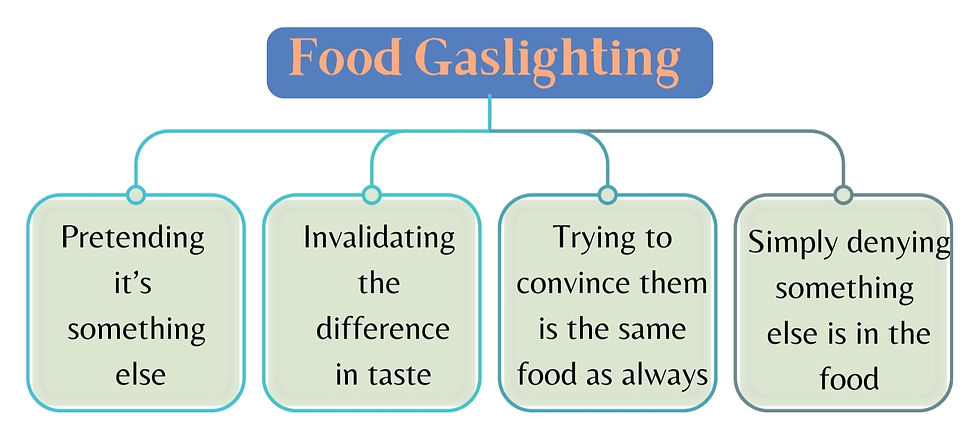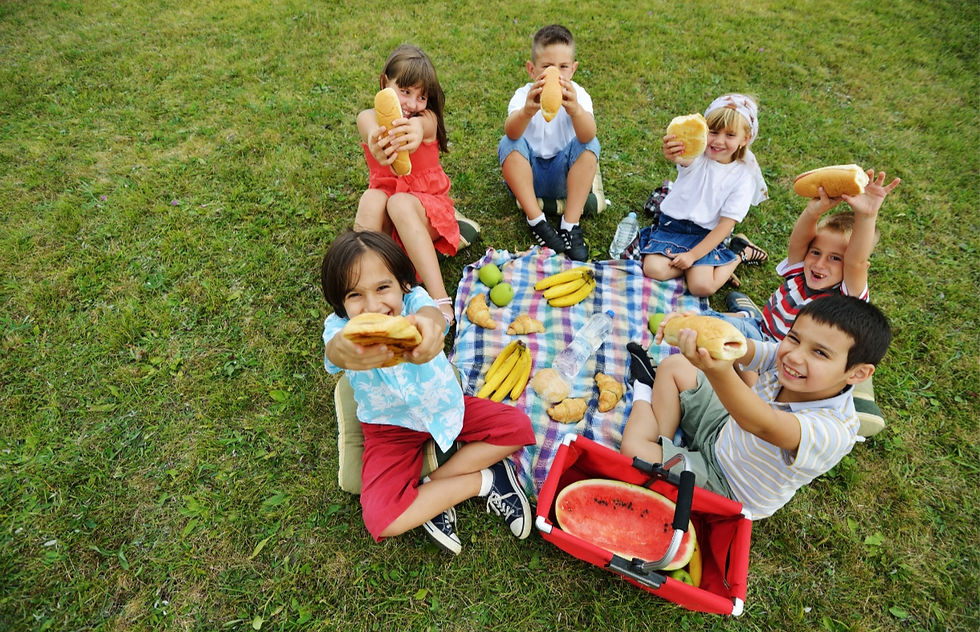As parents, we all want our kids to eat well, try new foods, and grow up healthy, but sometimes, in the effort to get them to eat non-preferred foods, we can fall into a tricky territory I have termed "food gaslighting".
What do I mean by "Food Gaslighting"?
Food gaslighting is when parents or caregivers mislead or deceive children about what they’re eating, hoping they’ll consume foods they’d usually reject and then pretending it’s something else, invalidating the difference in taste, trying to convince them is the same food as always or simply denying something different is in the food.

At first glance, it might seem like a harmless, even clever, way to get kids to eat a variety of foods or to eat "healthy" foods, but this tactic can backfire in ways that affect more than just their meals.
How Does It Impact Kids?
Imagine this: A mom hands her child a plate of food with pork, but when the child asks what it is, she confidently says, “It’s chicken.” The child, trusting their mom, takes a bite—only to find out it doesn’t taste like chicken at all. Here’s where the problem begins.
Trust vs. Confusion Kids are naturally trusting. They rely on their caregivers for guidance in almost everything. When they’re told something is “chicken” but it doesn’t taste like what they know, they feel confused. However, instead of trusting their own taste buds (their own bodies), they may start doubting themselves and rely more on what their parent says than on their own body’s signals.

This is where the real harm lies: food gaslighting teaches kids to second-guess their own instincts. Put in other words, we tamper their self-confidence and assertiveness, even when we have the best intentions.
Over time, this can lead to a disconnect between what their body is telling them and how they respond to food. They may stop listening to their hunger cues or their taste preferences, which can affect their relationship with food well into adulthood.
They may drop preferred foods or their food refusal may worsen, because now, they know they can't trust you. And when I say this can affect beyond mealtimes, I mean that if a child is second-guessing themselves with "just food", this same pattern of self-doubt could emerge in other areas of their lives, and if I speak (or write) from personal and professional experience, most of the times, it does!
Let's dive in: The Broccoli Trick
Another common scenario is when parents hide vegetables in familiar dishes. Let’s take broccoli in mac and cheese, for instance. The child eagerly takes a bite, but then, they spot the green bits, and the illusion shatters. They might feel betrayed or tricked—emotions you don’t want associated with food or yourself.
Instead of learning to explore and appreciate new flavors, they associate those foods with distrust and deception. Food becomes less about nourishment and more about whether they're "safe" to eat or not.
Why It Undermines Self-Confidence
Food gaslighting can have an even deeper impact by shaking a child’s self-confidence. When a child eats something that doesn’t taste right but is told it’s “just like chicken,” they start doubting their own judgment. If mom says it’s chicken, maybe I’m wrong?” This can create a pattern where the child questions their inner signals, setting the stage for long-term confusion around food and even other areas of life. This is one way we may disconnect their thoughts from their intuition.
As parents, we want to support and build our children’s trust in themselves, their bodies, and their instincts. Food gaslighting does the opposite—it teaches them to mistrust their senses, which can erode their confidence over time.
Beyond eroding their relationship with food and their bodies (as if this is not bad enough), when kids realize what is actually happening, it erodes THEIR trust in US, the parents or caregivers. Not only on what we serve at mealtimes, but this mistrust can extend beyond the table. "If mom can lie to me about this, what else is she lying about?"
If you think your child cannot possibly think this way, think again!
As a former picky-eater, I can tell you, it's definitely possible!
So my question to you is, are the hidden veggies or the new food, really worth jeopardizing our little one's trust and self-confidence ?
What Can We Do Instead?
Rather than tricking or deceiving kids, we can foster a healthy relationship with food by:
Involving them in food prep: Let them help in the kitchen and explore ingredients in a fun, pressure-free environment.
Being honest: If a food is new or something they’ve rejected before, acknowledge it. "I'm adding some broccoli (or whatever it is). Let's try it together in a different way."
Celebrating exploration, not deception: Encouraging kids to try new things doesn’t have to involve hiding the truth. Highlight the adventure of discovering new flavors and textures, making it a positive experience.
Play with them: Invite your kids to enjoy their non-preferred foods from a different angle that doesn't involve eating them. You can add them to a sensory box, use them as paint-brushes, or make a colorful and exotic DIY craft.
Get together with friends or family: enjoy an outdoor picnic and take this fresh opportunity to try something new.

The Bottom Line
Food gaslighting might seem like a quick fix to get kids to eat certain foods, but in the long run, it can break down their trust in both their caregivers and themselves. As parents, we have the responsibility to support our children’s nutrition AND self-confidence. Learning to navigate their preferences around food and supporting their intuition.
Let’s encourage our kids to build an intuitive and healthy relationship with what they eat by being honest and respectful of their choices. After all, food isn’t just about nourishment—it’s also about trust and connection.
If this post resonated with you, PLEASE share it! Together, we can raise awareness about the impact of food gaslighting and start creating healthier, more trusting relationships between our kids and the food on their plates.
By taking small steps, we can foster confidence and trust that will serve our children far beyond the dinner table. Let’s Be and Raise: Empowered Eaters!

Comentarios